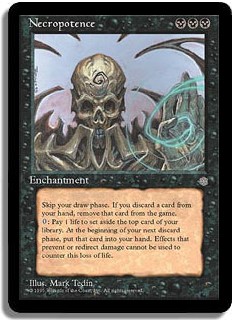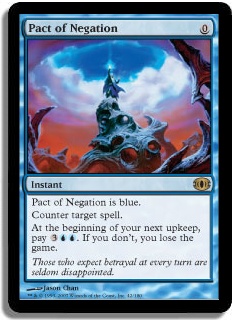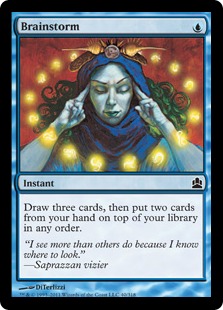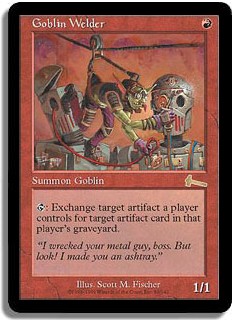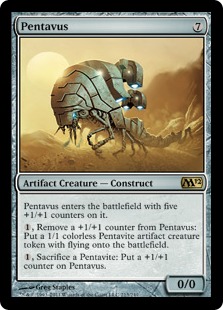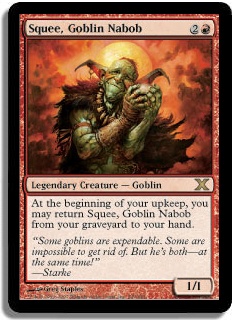Games and matches of Magic tell narrative stories that we as players share with one another. Walk around a tournament hall in between rounds and listen: “I played this, and then he played this. So, I killed his guy and obviously he had the other thing!” “Oh, wow! What a blowout!”
The best and most interesting games of Magic become more than just stories but take on almost folk legend type status among Magic players: Nassif conjuring Cruel Ultimatum to the top of his deck or Craig Jones ripping Lightning Helix to beat Oliver Ruel in Honolulu.
Today’s article I am going to tell a few stories about some of the best stories I’ve seen unfold in games of tournament Vintage. I’ve been playing for a long, long time, and I’ve seen a lot of strange stuff happen in Magic’s oldest format that I’d like to share with my readers. Some of these lines of play are really, really good lines of play; others crux pretty hard on really, really bad lines of play; and still others rely on the improbable, unlikely, or downright lucky taking place—but nonetheless, these are among the most brilliant and most brutal things I’ve seen happen in my time playing Type I / Vintage.
Enjoy:
“NECRO-LOCKED? NO PROBLEM”
This is perhaps the strangest game of tournament Magic I have ever witnessed; if I hadn’t watched it unfold before my own eyes, I probably wouldn’t believe it ever took place.
“Necropotence is a subtle card; you can’t deck without a draw step…”
It was round seven of eight in an SCG Power 9 Vintage tournament. I finished my round and locked up top eight (as I will be able to draw in) and decided to watch other prospective top eight players battle in the X-1 elimination bracket. One of the old time Michigan Vintage guys, Josh Franklin, was battling a game, and as I walked over he coolly looked up and informed me: “I’ve got game one, and he’s Necro-locked.”
There were six minutes left in the round, so this was a done deal, right? Hardly; this would turn out to be one of the most mind-boggling matches of Magic I have ever witnessed. The matchup was Josh playing Gifts Tendrils against somebody else playing TPS.
So, Josh was correct that his opponent was Necro-locked; his opponent had seven cards in hand and was simply shipping the turn. However, I noted that things were a little bit awkward for Josh, despite his crippled opponent. The opponent had an Engineered Explosives set to zero in play, which would negate the Empty the Warrens Josh had left in his deck. Josh’s Tendrils of Agony was in the graveyard, and both Recoup and Yawgmoth’s Will were exiled, and his lone copy of Echoing Truth was pitched to Force of Will. Josh’s maindeck Tendrils had been Duressed into the graveyard.
Josh’s lone path to victory was a copy of Burning Wish left in his deck, but no big deal since his opponent couldn’t draw cards and couldn’t win the game. Normally, in such a situation, what I would do is sculpt a hand where I have enough permission to stop any amount of counters and then eventually Burning Wish for sideboard Tendrils and win (His opponent was only at one!). Sculpting a perfect hand is an even stronger option, since there is very little time left in the match, and a draw in this game gives him a match win.
“The only road to victory…”
Here is what actually ended up happening:
Josh’s opponent had four lands and a Mox in play, and Josh had four lands and two Moxes in play. Josh drew Brainstorm on his turn, which made his hand Mana Drain, Force of Will, Force of Will, Brainstorm. Josh immediately opted to cast the Brainstorm and found his Burning Wish and another blue card to pair his second Force of Will. Now, holding the Brainstorm is a much stronger play in my opinion since if he ever drew the Burning Wish, he would be able to Brainstorm it to the top of his deck in case his opponent was waiting to cast Duress, and as I had already stated, I would wait (and for good reason) to set up an unbeatable hand in this scenario since my opponent literally gets no new cards for the rest of the game.
Josh cast the Burning Wish and quickly realized that he was one mana short of actually casting a Tendrils of Agony; however he had exactly enough to cast Yawgmoth’s Will, which would get back Black Lotus and a Mox and allow him to Tendrils from his graveyard. Which was the plan he opted to make. Keep in mind that this was before the creation of the “exile” zone, so Burning Wish for a removed-from-game Yawgmoth’s Will was a perfectly legal and common play.
In response to Josh putting Tendrils of Agony onto the stack, his opponent tapped all five of his mana to hard-cast a Force of Will. Josh responded by Force of Will-ing his opponent’s Force of Will. Josh’s opponent played Pact of Negation on the Force of Will, and Josh let the Pact of Negation resolve and played his second Force of Will to push through the Will. Much to Josh’s dismay, his opponent played a second Pact of Negation to stop his Yawgmoth’s Will. Fortunately, his opponent was going to have to pay for two Pacts with only five lands in play.
“Surprise! Free counter that doesn’t cost one life…”
Yet again, the improbable happened: with two Pact triggers on the stack, Josh’s opponent cast Dark Ritual and a threshold-ed Cabal Ritual and paid for both Pacts!
I actually couldn’t help it and burst into laughter. Josh spun around and glared really angrily at me: “I’m sorry! It’s just really funny!”
Josh was sufficiently tilted at this point, and although there was only about two minutes left in the game, while he still had twenty-five or so cards left in his library, and his opponent was still Necro-locked, he opted to concede. They both shuffled up quickly and started game three with thirty seconds left in the round—the TPS guy had the nuts and won on the second turn, and Josh was eliminated from the tournament.
It was one of the most improbable comebacks I had ever witnessed in a Magic tournament. It was absolutely absurd how many things had to go wrong for Josh to lose this game, but it was also interesting how many subtle mistakes Josh had to make in order for this game to slip away. I always come back to this game as a reminder that when you are winning, it is still important to make the correct plays because if your opponent hasn’t conceded, they are probably just waiting and hoping you will make a mistake that they can take advantage of to get back into the game.
That day, I watched a very good Vintage player make a few sloppy plays and lose to a Necro-locked opponent, and if that can happen, literally anything can happen!
THE GREATEST BRAINSTORM EVER CAST
“I’m not going to lie, I was really happy to draw Brainstorm off the top!”
—Mark Biller
I thought it would be fun to offset a story about a terrible Brainstorm with one about an amazing Brainstorm—a Brainstorm of legend, if you will, cast by Mark Biller in the Vintage Championship in 2005.
I also wrote about this game in an article published on February 1, 2006 titled: “Four Tips on Winning with Mana Drain.”
Oh, how the times have changed since then, but nonetheless this story is still amazing.
Mark Biller was playing his Control Slaver deck in the deciding game of the 2005 Vintage Championship against David Allen’s Aggro Mud deck. Mark had lots of land in play and multiple counterspells in hand, but David had a 1/1 Triskelion on the board attacking Mark’s low life total. Mark was at five life and drew Brainstorm, but didn’t cast it; he instead simply passed the turn. It was a smart play because Mark knew that if he didn’t find what he was looking for—a Goblin Welder or Yawgmoth’s Will—to rebuy his robots and goodies from the graveyard, he would be forced to draw the two bricks Brainstorm put back on top of his deck and likely lose the game.
On David’s turn, he attacked Mark down to four, played a land, and passed the turn.
On Mark’s turn, he again drew nothing, waited on Brainstorm, and passed the turn.
On David’s turn, he attacked Mark down to three and passed.
Mark blanked again and shipped the turn.
David attacked Mark down to two.
Mark untapped and cast Brainstorm at two, having waited to dig three cards deeper into his deck at the expense of taking three more damage from the Triskelion down to two life. The three cards were in order: Force of Will, Mox, and GOBLIN WELDER!!!
“Good to see you, old friend…”
Goblin Welder was literally the last card down Mark saw with Brainstorm, and if he hadn’t waited as long as he had, he would have never seen it and for sure lost the game! Mark cast his Goblin Welder and passed. On David’s turn, Triskelion brought Mark down to one hit point. Mark untapped and Welded in his Pentavus with multiple counterspells in hand, and the game was over. Mark’s Brainstorm, the most patient one I have ever seen in the highest pressure situation I can imagine, paid off, and he was the 2005 Vintage Champion!
“We used to Tinker for this guy before Inkwell Leviathan, Myr Battlesphere, and Blightsteel Colossus…”
VALUE MULLIGAN TO FOUR
The finals of a Magic tournament are a bizarre place where literally anything and everything can happen, and often does. In my experience, I can vividly remember every subtle detail about matches I’ve played in the finals of a big tournament, simply because every little thing becomes so important when you’ve worked so long and hard to make it to the finals, and now the ultimate victory, the difference between Champion and runner-up, rides on three draws, three games, of Magic.
Back in the day, when Vintage was a really popular format, there used to be a lot of Type I events in the Midwest. R.I.W. Hobbies, the store I work at in Michigan, used to host monthly Vintage events that would attract between 50-75 players to play for pieces of Power 9. In this particular tournament, I made it to the finals playing a four-color control, or “Keeper,” deck, and was paired off against a Psychatog deck.
The matchup was a real “grind fest,” full of drawing cards at the end of the opponent’s turn, big counter battles, and jockeying for position to resolve the dreaded Yawgmoth’s Will.
I remember distinctly that we had played two very close games of Magic, where I was able to narrowly edge him out in game one, and he had narrowly beaten me in game two. So, I was anticipating another hard-fought game three—was I ever wrong.
I was on the play in game three and fanned out a very mediocre hand of seven and opted to throw it back.
Keep in mind that the mulligan rules worked differently back then; the active player would mulligan until they decided to keep a hand, and then the other player would decide to make mulligan decisions.
My hand of six had no land, and I shipped it back. I could see my opponent getting excited about the prospect of me dropping down to five.
My hand of five was four lands and a Sundering Titan. So, once again I had to ship it back. I opted to keep my four.
My opponent basically grinning from ear to ear confidently announced he would keep his hand of seven, knowing that he was already up four cards on me before the game had even begun.
“I feel kind of bad about this,” I said. “But I am pretty sure I have the best mulligan to four my deck is capable of producing…”
I played Mox Sapphire. It resolved. I played Mox Pearl. It resolved.
I held my breath, tapped my two Moxes, and put another card onto the stack:
“Everything is fair now…”
My opponent looked back literally stunned, as he took in exactly what was happening and began calculating how bad Balance was going to be for him. I knew instantly it was going to resolve. “That is ridiculous,” my opponent said with a frown, as he discarded down to one card. The mulligan had actually worked to my advantage, with the help of the nut perfect hand and my opponent not having Force of Will. The other kicker was that Balance doesn’t equalize artifacts in play, so I went from being down four cards from mulliganing to being up two Moxes (the best possible ones) in play.
On his turn, he played an Underground Sea and passed the turn with one card in hand.
On my turn, I drew a card and fired off Ancestral Recall. He shook his head, visibly annoyed and massively tilted, and asked: “Did you topdeck it, or was it your fourth card?”
I confirmed for him that it had been my fourth card and easily won the match.

“Snap keep, on a mulligan to four…”
Every time I get run over by an opponent who has the nuts, I think about the time that I had the most improbable nut-draw mull to four and think to myself, “You get good draws too sometimes…” and I don’t feel so bad about it anymore.
THE GAME WHERE ‘BEEPY-BOOPY,’ OR WAS IT ‘FLIPPY-FLAPPY,’ OR WAS IT ‘WHEEZY-WAZZY,’ DEFEATED THE SHERIFF
A long, long time ago in a Vintage metagame far, far away, something I cannot possibly fathom took place at a Monday Night Vintage tournament in Michigan. After the first round was over, one of the local players, who didn’t really play Type One but was battling in a no-proxy tournament on this day for fun, came up to me and shared with me one of the most befuddling stories I have ever heard.
This player, an older and pleasant individual, whose mannerisms and easy-going temperament were clearly a product of the late sixties and early seventies and whose drooping fu-man-chu style moustache had affectionately earned him the nickname “the Sheriff” among the local Magic players, came up to me to share a story from his first match of Vintage.
“Hey, Brian—Man, I lost!”
“That sucks. What are you playing?”
“Ah, dude, I’ve got a red burn deck.”
“Cool. What did you lose to?”
“Oh, it was this crazy Goblin guy.”
“Ah, you lost to a Goblin deck. Sure, that is probably a tough matchup for burn.”
“Nah, man. It wasn’t a Goblin deck; it was this one Goblin he had that beat me.”
“Oh, I see. Which Goblin did he beat you with?”
“It was called like, ‘Beepy-Boopy,’ or something.”
Obviously, there are no ‘Beepy-Boopys’ in Magic. And, my first assumption was:
“I am not ‘Beepy-Boopy’…”
“Ah, he had Kiki-Jiki, then?”
“Nah, dude it wasn’t Kiki-Jiki; it was like ‘Flippy-Flappy‘ or something.” I was now sufficiently confused and reiterated asking if he was sure it wasn’t Kiki-Jiki.
The Sheriff continued to insist it wasn’t Kiki-Jiki (“Man, I know what Kiki-Jiki does, and it wasn’t him”), and when I asked what the Goblin did all he would respond with was: “Ah, man it was crazy,” or “it did weird things, man.” He also added that the name of the card might have been, “Wheezy-Waazy,” “Heepy-Hoopy,” Zippy-Zappy,” or “Icky-Acky.”
This conversation went on for literally five minutes, and despite my best efforts, I could not figure out what card he was referring to. Finally, one of my friends finished their match, and I had to part ways with the Sheriff, as we went to get food or something.
Two-rounds later, I had shared the “Beepy-Boopy” riddle with Biller and Franklin, and they were both sufficiently puzzled. The two just kept asking, “Is he sure it wasn’t Kiki-Jiki?”
We had finished our rounds and were standing outside on a cool autumn night enjoying the weather and talking about our games, when the Sheriff popped outside and with an excited and eager look on his face blurted out: “Hey, Brian man, IT WAS SQUEE!”
I started laughing so hard I could hardly contain myself: “You lost to Squee!? How?”
“He just kept playing it every turn, and every time I killed it, he would just play it again, man!”
From this, I was able to figure out that he had played against a well-known Vintage player from back in the day named Ben Perry, who was playing Dragon.
I asked Ben about the match, and he said that he had gotten into a tough spot on life and couldn’t find a Bazaar of Baghdad to set up his combo and that the Sheriff had Red Elemental Blasted his Intuition, which was his only source of business.
So, Ben cast Squee in case his opponent played a guy, so that he could block with it. To Ben’s surprise, his opponent promptly Lightning Bolted his Squee. So, he brought it back and played it again, and his opponent snap-killed it again, and again, and again, and again… In one game, the same Squee, Goblin Nabob from a crippled Dragon player ate five burn spells…
“I go by many names, Beepy-Boopy, Flippy-Flappy, Wheezy-Wazzy, etc., but never Kiki-Jiki…”
THE EVERYTHING AGAINST NOTHING GAME
(I have been friends with Vintage mastermind Paul Mastriano for a long time, and this particular game is one that we still often reminisce about even many years later. In fact, he has such a knack for telling the story that I actually asked him if he would write his recollection of the game in my article for this week!)
Before Brian and I were teammates, he was a guy that I always recognized was a great technical player, but I hadn’t really thought of him as the kind of player that was able to defeat another player on a psychological level by using bluffs and banter to compensate when the cards themselves had failed him.
One day at the finals of the Meandeck Open tournament in Columbus, Ohio, I got a glimpse of how talented he was at executing a pro-level Jedi Mind trick.
It was game three, and Brian was playing Control Slaver (a Mana Drain control deck) against an opponent’s Gifts Deck, which is essentially control with a strong combo finish in the card Gifts Ungiven. As the control mirror often does, the game built up to the inevitable all-in “counter war” where the two would fight over a key spell, and the one who won the counter war almost always would win the game—but not this time.
The Gifts player played the deck’s namesake card, and Brian tried to Mana Drain it; his opponent Force of Willed his Mana Drain. Brian was still holding a sizeable grip of cards (three lands and Sundering Titan), but was completely out of countermagic. At this point, as an observer, I knew that the game was pretty much over, and all Brian’s opponent needed to do at this point was to search his deck for the most common four-card Gifts pile, and from that position he’d be easily able to win the game.
Brian knew he was dead on board, but he didn’t let his opponent see his frustration; instead he became even more confident. He made a motion to tap two lands as if he had a Mana Drain, but then thought for a moment and decided that it was simply unnecessary—“Go ahead and Gifts,” he said, as if he couldn’t care less.
His opponent searched his deck, and after finding three of the cards he was looking for, DeMars added a comment: “So you’re just going to go get Recoup, Black Lotus, Time Walk, and Yawgmoth’s Will, right?”
The Gifts player stopped for a moment and sheepishly said, “Yeah…” as he flopped those exact four cards onto the table. Brian casually handed him two of the cards and then sat up in his chair, ready to pounce on whatever card his opponent dared to cast next.
But the fear had crept into his opponent’s mind. Instead of simply executing his kill condition, the Gifts player had convinced himself that Brian had clearly thought through this obvious line of play and that he was about to get his teeth kicked in by a flurry of countermagic. He Recouped Time Walk, hoping to draw a counterspell, and when he didn’t on his Walk turn, he passed the turn.
Brian drew Mana Drain on his turn. He didn’t act too excited about it, looked at his mana situation, and passed. Once again his opponent drew a card and passed the turn. DeMars topdecked another Mana Drain, and this time he complained openly about getting terrible topdecks. His once confident demeanor had shifted, and he suddenly was acting as if he was probably just dead.
The Gifts player topdecked a counter and felt that it was time to make a play. He Recouped the Yawgmoth’s Will, and when Brian fired off a Mana Drain, the Gifts player countered back only to be Mana Drained again. On Brian’s turn, he used the Drain Mana to play the Sundering Titan, and the monstrous robot ripped a huge hole in his opponent’s mana base. A few turns later, the Titan sealed the deal.
The Gifts player sat in his chair bewildered at what happened, until his friend came over and asked him, “Why didn’t you just win after you cast Gifts? He had nothing!”
I often think back to what Brian did here and remember that sometimes making your opponent believe that you have the cards is just as good as actually having them.
* * *
Games of Magic are like stories, and the best games, like the best stories, are bound to get retold again, and again, and again. I hope that you enjoyed these ones!
Next stop GP San Diego, and after that Worlds!
Hopefully I’ll have some good stories to tell after those events (and hopefully not tales of bad beats!).
Cheers,
Brian
Thanks to Paul for doing a great story write up.

